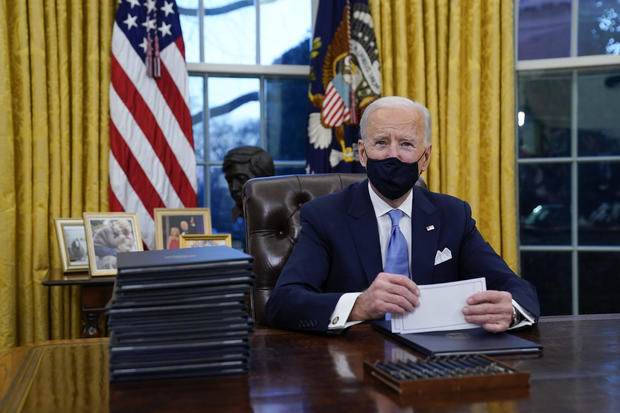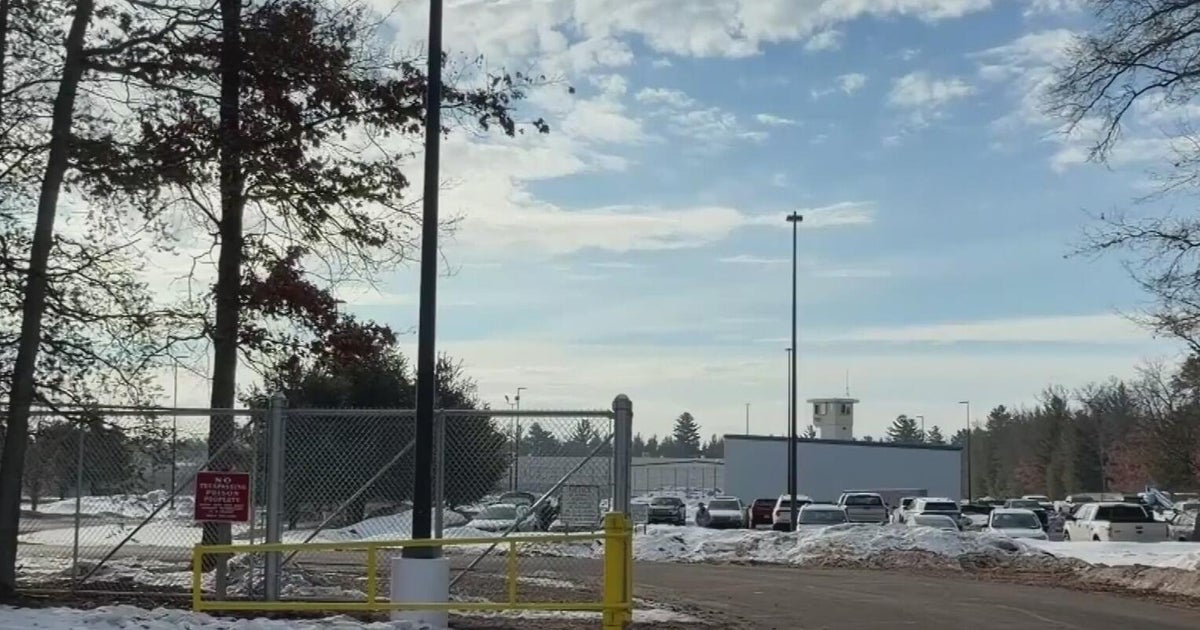Biden signs executive actions on COVID, climate change, immigration and more
On his first day in office, President Joe Biden signed more than a dozen executive actions, some of which reverse decisions made by his predecessor, former President Donald Trump.
Several executive actions will make changes to the U.S. response to COVID-19 and try to ease some of the financial strain on Americans resulting from the pandemic. Other executive actions directly target and undo Mr. Trump's actions on the environment, immigration, the U.S. census, and regulatory changes.
Mr. Biden signed three executive orders in the presence of reporters — implementing a mask mandate on federal property, increasing support for underserved communities and rejoining the Paris climate accord.
"I thought there's no time to wait. Get to work immediately," he said.
Mr. Biden said Mr. Trump had left a letter for him, which he described as "very generous," but said he wouldn't divulge the contents. "Because it was private, I will not talk about it until I talk to him, but it was generous," he said.
Incoming top Biden White House advisers outlined and described the executive actions on a press call Tuesday evening, and Biden aides also promised there would be more to come.
"In the coming days and weeks we will be announcing additional executive actions that confront these challenges and deliver on the President-elect's promises to the American people, including revoking the ban on military service by transgender Americans, and reversing the Mexico City policy," incoming White House press secretary Jen Psaki said in a statement.
Below is CBS News' breakdown of Mr. Biden's first 15 executive orders and the two executive actions he was expected to signed on Wednesday:
COVID-19 response
Start a "100 Days Masking Challenge," calling for a nationwide face mask and social distancing mandate in federal buildings, on federal lands and by federal employees and contractors.
Restructure federal government coordination to the COVID-19 pandemic. The Biden White House is bringing back an Obama-era position called the "Directorate for Global Health Security and Biodefense," which was organized with additional staff within the National Security Council after the 2014 Ebola epidemic. This directorate office was dispersed into other roles during the Trump administration, but Biden and his campaign advisers argued the move decreased the preparedness of the federal government for the COVID-19 pandemic. Mr. Biden will also formally implement a "response coordinator" who will report to the president on vaccine, testing and personal protective equipment production, supply, and distribution. Mr. Biden has appointed Jeff Zients, who has been overseeing Mr. Biden's COVID-19 team for the presidential transition.
Rejoin the World Health Organization (WHO), which the Trump administration was in the process of leaving. Mr. Biden is also looking to reestablish the U.S. as an active leader at the WHO.
Financial relief for Americans
Extend eviction and foreclosure moratoriums. To do this, Biden will call on the Centers for Disease Control and Prevention to re-implement and extend the already defunct moratorium until at least March 31. The new president will also call on the Departments of Agriculture, Housing and Urban Development, and Veterans Affairs to extend the foreclosure moratoriums for their federally backed mortgages. "These emergency measures are important," Mr. Biden's top economic adviser Brian Deese said on the call with reporters, "There are more than 11 million mortgages guaranteed by the VA, Department of Agriculture and HUD that would be extended."
Continue "pause" on student loan payments until September 30. The Biden advisers continue to assert Biden still supports his campaign pledge to cancel $10,000 of student loans, but this will take time as it has to go through Congress.
Environment
Rejoin the Paris Climate Agreement. The Paris climate negotiations took place under the Obama administration and were led by incoming climate change czar John Kerry when he was secretary of state. This will take 30 days to go into effect.
End Keystone XL pipeline and revoke oil and gas development at national wildlife monuments. To do this, Biden's climate adviser Gina McCarthy explained the Biden administration will discard or redo more than 100 "harmful" presidential proclamations, memoranda or permits signed by the Trump administration that the new administration views as detrimental to the environment.
Revoking permits will effectively nix the Keystone pipeline. Mr. Biden also will reverse the 2020 decision by the Trump administration to allow land development at the Bears Ears and Grand Staircase-Escalante national monuments in Utah and at the Northeast Canyons and Seamounts Marine national monuments in New England, which were set aside for wildlife protection by former President Obama in 2016. Other changes include directing agencies to "consider revising vehicle fuel economic and emissions standards" and placing federal working groups to deal with greenhouse gases, according to an outline of the executive orders.
Human rights
Actions to advance racial equity through the federal government. Incoming Domestic Policy Adviser Susan Rice explained President Biden wants every federal agency to review equity in their programs and actions. For example, with this executive action the Office of Management and Budget will analyze if federal money is equitably distributed in communities of color and other places of need, the outline of the executive action said. Rice also said Trump's "harmful" 1776 Commission, the 18-member board he formulated in September, will be stopped. The commission's goal was to study the president's concern that the American education system was taking a too liberal approach to American history.
Count non-citizens in U.S. Census again. This reverses President Trump's order in July 2020 to not count undocumented Americans, which would affect federal allocation of money and federal representation. Rice on the Wednesday press call said Trump's was an "approach that violates the Constitution and the Census Act and is inconsistent with our nation's history and our commitment to representative democracy." The Biden team's outline of the executive order said Biden "will ensure that the Census Bureau has time to complete an accurate population count for each state" and that "he will then present to Congress an apportionment that is fair and accurate so federal resources are efficiently and fairly distributed for the next decade."
Strengthen workplace discrimination protections based on sexual orientation and gender identity. At agencies, this broadens the federal protections against sex discrimination to include LGBTQ Americans.
Immigration
Defend "Dreamers" program for undocumented young Americans. Mr. Biden, in this executive order, calls on Congress to grant permanent status and a path to citizenship to Dreamers — almost a million undocumented young people who were brought to the country as children and shielded from deportation by President Obama. The Trump administration challenged the law but the Supreme Court upheld it.
End so-called "Muslim travel ban," which in 2017 restricted travel and immigration to the U.S. from Syria, Iran, Iraq, Sudan, Libya, Somalia and Yemen, before adding Eritrea, Nigeria, Myanmar, Kyrgyzstan, and Tanzania in 2020. The State Department is also instructed to restart visa applications for these countries.
Change Trump's arrest priorities for Immigration and Customs Enforcement (ICE). This executive order will repeal the changes Mr. Trump made in the first week of his presidency in 2017 to make interior immigration enforcement much stricter. Few specifics were listed in the outline of the executive order, but the incoming Biden White House team stated the Department of Homeland Security, in partnership with other agencies, will "set civil immigration enforcement policies that best protect the American people and are in line with our values and priorities."
Stop border wall construction. Mr. Biden will end the national emergency declaration cited by the Trump administration to divert money to the building of the southern wall.
Keep protections for a group of Liberians in the country. Liberians who have been in the United States for many years will be able to remain longer. Their "deferred enforcement departure" will be extended an additional year, until June 30, 2022. President Trump briefly considered ending this deferment before ultimately extending the program.
Regulation
Freezing last-minute Trump administration regulatory actions. Technically, White House chief of staff Ron Klain will be charged with carrying out this out, and a presidential memo will formally state the regulations to be frozen.
Ethics
Formulate Executive Branch ethics doctrine. Mr. Biden wants every executive branch appointee to sign an ethics pledge. The pledge also demands federal employees promise "to uphold the independence of the Department of Justice," the executive order outline states.




